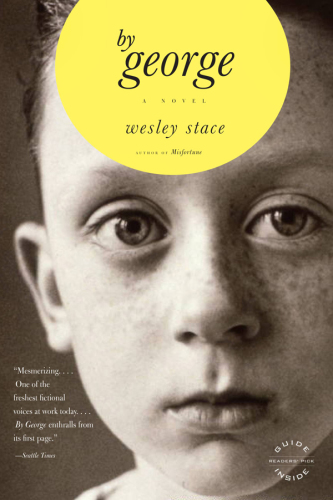
By George
A Novel
کتاب های مرتبط
- اطلاعات
- نقد و بررسی
- دیدگاه کاربران
نقد و بررسی

April 16, 2007
Singer-songwriter John Wesley Harding, writing under his given name Wesley Stace (Misfortune
), crafts a British performing family's saga filled with wit, warmth and imagination. George Fisher is 11 years old in 1973 when his mother, Frankie, enjoying a successful run as Peter Pan, delivers him to Upside Boarding School. George misses his family, particularly his 93-year-old great-grandmother Evangeline, who for many years performed as a ventriloquist—as did her son, Joe. Under the watchful eye of the headmaster, George learns to escape student responsibilities by cheating, throwing his voice and befriending the groundskeeper, who gives him ventriloquism how-to books. George's school-days narrative alternates with another memoiristic voice from 1930, that of Joe's dummy, also called George. While George the schoolboy leaves Upside, eventually finding work in the family business, George the dummy accompanies Joe on the road to entertain troops during WWII. In different eras, boy and dummy each finds his own voice, plus some understanding of a world full of trickery and illusion. Family secrets revealed are not much of a surprise, but Stace amasses enough gently ironic humor (including sly references to Harry Potter
and David Copperfield
), emotion and insight to carry his voices beautifully.

June 1, 2007
Stace's second novel (after "Misfortune") shifts between the viewpoints of two boys named George. One is a ventriloquist's dummy; the other is the ventriloquist's grandson. The dummy's narration takes some getting used to, and it sometimes drags, but it picks up as the duo entertains British troops during World War II. Overall, though, it's the story of the younger George that is more captivating, especially when he discusses his unhappy experience at boarding school during the 1970s in an interval that recalls some of John Irving's storytelling. The two Georges ultimately meet as part of the younger boy's search for his place in a family of domineering women. His search leads him back to a manuscript written by his long-dead grandfather, himself oppressed by the family matriarch. Stace, who writes and performs music under the name John Wesley Harding, has a real talent for re-creating a variety of settings, from battlefields to boarding houses to the backstages of vaudeville. This novel is an original, and it ends with a most satisfying revelation. Recommended for all libraries.Evelyn Beck, Piedmont Technical Coll., Greenwood, SC
Copyright 2007 Library Journal, LLC Used with permission.

Starred review from June 1, 2007
This second novel by the author of Misfortune (2005) wends its way through a labyrinth of familial idiosyncrasies, grudges, and conundrums. As John Wesley Harding, Stace writes lyrics and performs music, and his folksy style infuses an air of warmth and humor to what is essentially the story of a controlling woman who nearly ruins her entire family. The multilinear and multigenerational tale begins with the last days of an elderly vaudeville ventriloquist, Echo Ender, whose onstage success with her dummy, Naughty Narcissus, ensures entry into the entertainment world for future generations of her family. First comes Echos son, Joe, also a ventriloquist, who has a dummy named George; hes followed by his flamboyant daughter, Frankie, an actress; and then by her withdrawn son, also named George, who develops his own talent for throwing his voice at boarding school. The two Georgesone a boy, the other a dummyare the joint narrators in this saga of the backstage failures behind one familys onstage success. The two Georges stories eventually merge in a surprising conclusion to a novel that most readers will hate to see end. Characters spring to life in the words of the sardonic dummy, whose pointed comments about his wacky family make the book a hoot to read and beg the question, Whos in control, the puppet or the puppet master? Book groups will enjoy sorting out this one!(Reprinted with permission of Booklist, copyright 2007, American Library Association.)

























دیدگاه کاربران